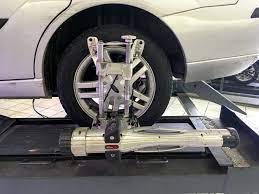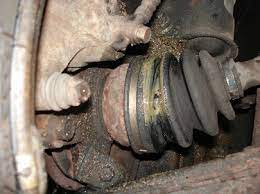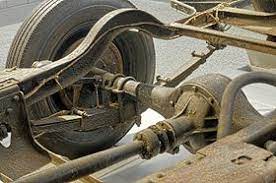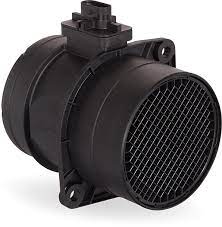Why Would a Car Shake While Accelerating & How Do You Fix It?
In this article we are going to look at the issue of excessive vibration while accelerating. We will help you try and find out why it is happening and hopefully give you some solutions to stop this troubling issue. If this problem only occurs when you accelerate however we do have some positive news, it’s not a really bad issue but you should still get this fixed quickly.
What Can Cause Shaking While Accelerating?
Shaking while you accelerate can be jarring and worrying because frankly the vehicle just does not feel right. If you were driving over a cobbled road maybe it wouldn’t seem so bad but on a smooth road surface this really shouldn’t happen.
There are potentially many reasons for this, some that are serious but others that can be solved easily. One thing is for sure though once you start noticing this issue you need to look into getting it diagnosed and fixed as it may turn a minor issue into something major if you do not.
Wheels Are Out of Balance
Ask yourself this quick question in your mind if you notice sudden shaking under acceleration “Did I change my tires or clip a curb recently?” If the answer to this is yes then we may have the culprit, your wheels are out of balance.

Cars need frequent wheel alignments to check that the camber, caster and toe angles are as close to factory specs as possible. If these angles are wildly off then you can very easily feel vibration through the steering wheel while you accelerate down the road.
Vibration from the steering wheel might indicate a front wheel alignment issue but if you feel it through your set then it may be the rear wheels. You may feel shaking at any speed with this issue but it can be more pronounced while speeding up.
The simple fox for this is to have a mechanic perform a wheel realignment. During this they will reset the angles of your wheels to make sure they are at their optimum levels. They will also check that nothing is damaged that may worsen the alignment issues.
Faulty Gearbox
Shaking while accelerating may indicate an issue with your gear box. It may mean a gear of bearing has become worn out or that you are low on oil in the gearbox itself. You may hear audible noise and feel vibration when a specific gear is selected.
You can road test this theory by engaging the clutch on a quiet stretch of road while you are accelerating. If the shaking stops with the clutch engaged the issue may be a result of the gearbox and you can investigate further.
Gearboxes are complicated so unless you have mechanic training you should take this to a professional. If you have the skill you can check the oil level in the gearbox and top up if needed. If this resolves the issue then just monitor the situation for a while and check that you are not losing oil rapidly.
Worn CV Joint
Another wheel based issue that may be at fault is the CV Joint. This part serves as a connection between the shafts that drive the wheels and the wheels themselves. It is designed to have a range of motion that allows these inflexible shafts to still freely rotate even on rough roads.

Known as the constant velocity joint it is a bearing that is packed with grease that is encased in a rubber boot. It can be affected by leaks as well as dirt and water getting inside the boot. As this part wears it loses its flexibility and the result is vibration and in extreme cases steering issues.
If the noise and vibration is especially noticeable while turning a corner there is a real possibility that the CV joint is the problem. A visual inspection of the part may show you that it is split or leaking grease. Any visible signs of damage will be cause to get this part replaced.
Engine Misfires
As our engine runs the multiple cylinders all have combustion events where fuel and air is mixed together, compressed, then ignited by a spark from the spark plugs. This happens in a specific order in a rapidly repeating pattern.
If an issue arises that causes one or more of the cylinders to fail to ignite or to ignite incorrectly this would be called a misfire. As we accelerate the firing sequence speeds up to provide more engine power. This can result in audible signs of misfire and shaking.
There can be many reasons for misfires as it can be connected to several of the car's systems. Anything that affects fuel flow, air flow or the spark of the engine can be at fault. Often you may want to use an OBD2 scanner tool to narrow down the cause of the misfire.
Once you have an answer in the form of an error code you can determine the best course of action. Issues with spark plugs can be easy to solve but there may be more complex issues deeper in the engine.
Damaged Driveshaft or Propshaft
If your driveshaft or propshaft is not correctly aligned you may get some concerning vibration while accelerating. Alignment of shafts is important when it comes to cars as they ensure the efficient transfer of power from the engine all the way to the drive wheels.

Vibrations in a front-wheel drive vehicle may be caused by the driveshaft at the front while rear-wheel drive vehicles may have a fault with either of the two driveshafts. As mentioned the CV joint is also involved in this equation.
If your prop shaft is out of balance you not only feel vibrations while accelerating but smaller ones at lower speeds.
This can be a difficult issue to fully diagnose and you will likely need to elevate your vehicle on a ramp to get a good look at what is happening with the shafts. They should all be smoothly rotating around a constant fixed point.
Unless you have a really tricked out home garage and some serious mechanic skills this might be a job for the professionals.
Worn Engine or Gearbox Mounts
The engine and the gearbox are mounted to the frame of your vehicle at various points in order to make sure they do not move around. You have to consider that the engine is experiencing a series of small explosions every second and if not properly mounted would jump around a lot.
If any of these mounting points becomes detached or worn you may get vibration from the engine or gearbox moving around bumping into things they should not. You often get a knocking sound with the shaking.
It is usually easy to diagnose this issue as the mounting points are usually accessible and you should be able to see signs that they are worn. Depending on the severity of the problem you may or may not be able to replace the mounting yourself.
Faulty O2 Sensor
Believe it or not, a humble sensor can actually be the cause of your shaking while accelerating. Located at the exhaust, O2 sensors measure emissions to determine how much fuel to release to the cylinders in the fuel injected engine.
A faulty O2 sensor could cause the engine to not get enough fuel which can cause shaking as the vehicle drives away. This is one of those issues that can be diagnosed with an OBD2 scanner tool and repaired fairly inexpensively.
Faulty MAF Sensor
The Mass Air Flow Sensor performs a similar task to the O2 sensor but instead controls air flow instead of fuel. If the air sensor has a fault then the fuel/air mixture may not be correct and this can cause misfires.

This is a slightly trickier repair than the O2 sensor as you do need more specialized scanning tools to detect and diagnose this issue. You may need to visit a mechanic if the MAF is to blame for your issue.
Can You Ignore Shaking While Accelerating?
As a general rule anything that noticeably changes the way your car drives and reacts is not something to ignore. It may seem like a minor vibration or shaking now but if left unresolved it could turn into something more complicated to repair.
Driving around when you know some issue must exist is just inviting higher repair bills later and potentially a failure in your vehicle that is dangerous. If a CV joint collapses for example it can affect your steering ability and if that happens at speed on a busy road things can turn bad quickly.
Catch these issues early and do not ignore the shaking. Right now it could cost less than $100 but later it could be hundreds or even thousands of dollars. In the very worst case scenario it might even cost your or someone else’s life.
Conclusion
Shaking when you accelerate can be caused by a number of issues from engine, suspension or even humble sensors. Some will be easy fixes while others will likely require expert help. Just be mindful that a slight shaking can escalate quickly if you ignore it so head the issue off early and save yourself a lot of money in the long run.
Link To or Reference This Page
We spend a lot of time collecting, cleaning, merging, and formatting the data that is shown on the site to be as useful to you as possible.
If you found the data or information on this page useful in your research, please use the tool below to properly cite or reference Tow Ratings as the source. We appreciate your support!
-
<a href="http://towratings.net/blog/why-would-a-car-shake-while-accelerating-how-do-you-fix-it/">Why Would a Car Shake While Accelerating & How Do You Fix It?</a>
-
"Why Would a Car Shake While Accelerating & How Do You Fix It?". Tow Ratings. Accessed on April 26, 2024. http://towratings.net/blog/why-would-a-car-shake-while-accelerating-how-do-you-fix-it/.
-
"Why Would a Car Shake While Accelerating & How Do You Fix It?". Tow Ratings, http://towratings.net/blog/why-would-a-car-shake-while-accelerating-how-do-you-fix-it/. Accessed 26 April, 2024
-
Why Would a Car Shake While Accelerating & How Do You Fix It?. Tow Ratings. Retrieved from http://towratings.net/blog/why-would-a-car-shake-while-accelerating-how-do-you-fix-it/.